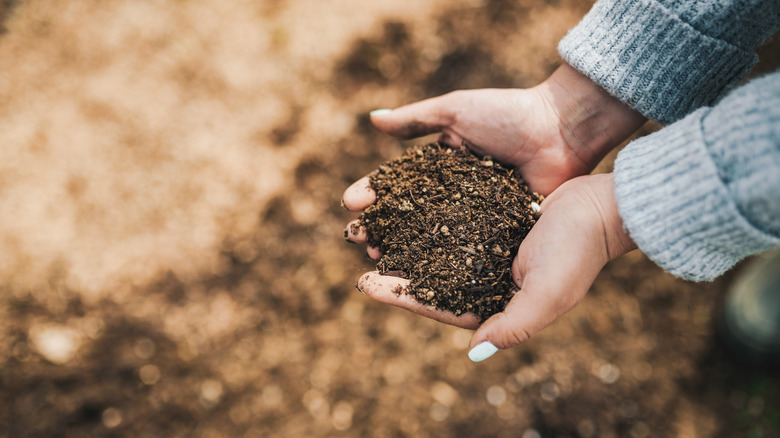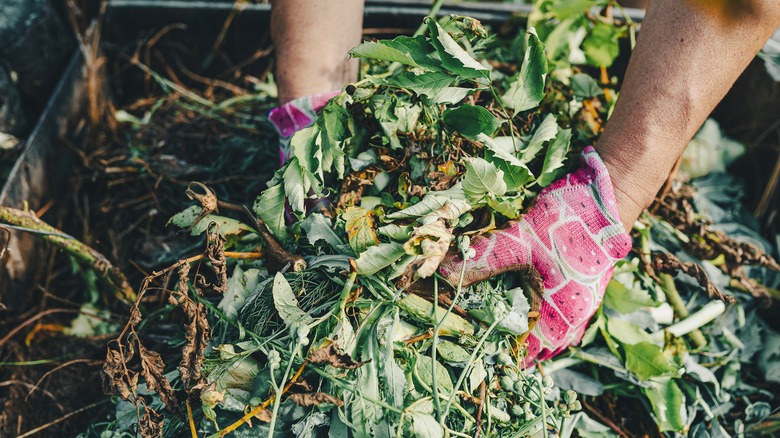How To Use Yogurt As A Natural Fertilizer In Your Garden
Yogurt owes its existence to a unique mix of bacteria, specifically probiotics, which are instrumental in fermentation. Interestingly, these probiotics are not just good for our gut health. Unbeknownst to many, yogurt is an impressive natural fertilizer capable of enhancing your garden's health. You can use a yogurt solution and apply it directly to your soil as a fertilizer.
Fertilizers are essentially food for your plants. Just as you need a balanced diet to be healthy, your plants also require a mix of specific nutrients to grow and produce flowers or fruits. Think of plant fertilizers as a balanced diet for your green friends. They typically contain three primary nutrients: nitrogen (N), phosphorus (P), and potassium (K), often referred to as N-P-K.
Nitrogen helps promote healthy leaf and stem growth, phosphorus is vital for robust root development and flower production, and potassium ensures your plants' overall health, boosting their immunity and improving their resistance to diseases and pests. Aside from these, fertilizers may also deliver secondary and micronutrients like calcium, magnesium, iron, and zinc, which are crucial for your plants' health and vitality. By using yogurt as a natural fertilizer, you can transform your garden using this simple yet potent household item.
Creating a yogurt fertilizer solution
Unleashing the fertilizing power of yogurt begins with creating a simple yogurt solution. It's a process as straightforward as it is effective. First, you gather some plain, unsweetened yogurt, which is a rich source of nitrogen, a nutrient indispensable for robust plant growth.
Next, it's time for a bit of mixing magic. Dilute the yogurt with water, following a 50:50 ratio. So, for every cup of yogurt, you'll add an equal volume of water. The result is a nutrient-rich solution ready to supercharge your garden. With your yogurt solution prepared, you're set to nourish your plants.
The method? Simply pour the mixture at the base of your plants, zeroing in on the root zone — that's where nutrients are taken up. (Repeat this process once or twice a month.) As the yogurt solution permeates the soil, it brings a host of beneficial bacteria or microorganisms.
These microscopic allies work tirelessly beneath the surface, breaking down organic matter to release nutrients, invigorating your soil's health, and supercharging nutrient absorption by your plants. They transform organic matter into vital nutrients your plants can readily absorb, setting the stage for enhanced growth and vitality. In this way, your garden doesn't just survive — it thrives, all thanks to the transformative power of a simple cup of yogurt.
Other ways to use yogurt in your garden
Another efficient method of using yogurt in your garden is incorporating it into your compost pile. Add leftover or expired yogurt to your compost heap, mixing it in thoroughly. The yogurt will introduce more beneficial microbes into the compost, accelerating the decomposition process and enriching it with essential nutrients.
Yogurt can also serve as a safe and natural disease fighter for your plants. The probiotics in yogurt ward off certain fungal diseases, giving your plants a protective shield against harmful pathogens. Applying a thin layer of yogurt at the base of your plants or as a foliar spray can help keep them healthy and robust.
Unlocking the potential of yogurt for your garden goes far beyond its nutritional benefits. Did you know that it can be an effective pest deterrent? The humic acid produced by yogurt can keep certain pests at bay, protecting your cherished plants from unwelcome pests like mice. Simply apply it around the roots of your plants to ward off these pesky invaders.
Yogurt also shines in its ability to accelerate moss growth. Applying a mixture of yogurt and moss spores onto the required surfaces creates an ideal environment for moss to flourish. In all these ways, yogurt proves to be an unexpected yet invaluable tool in your gardening toolkit.


